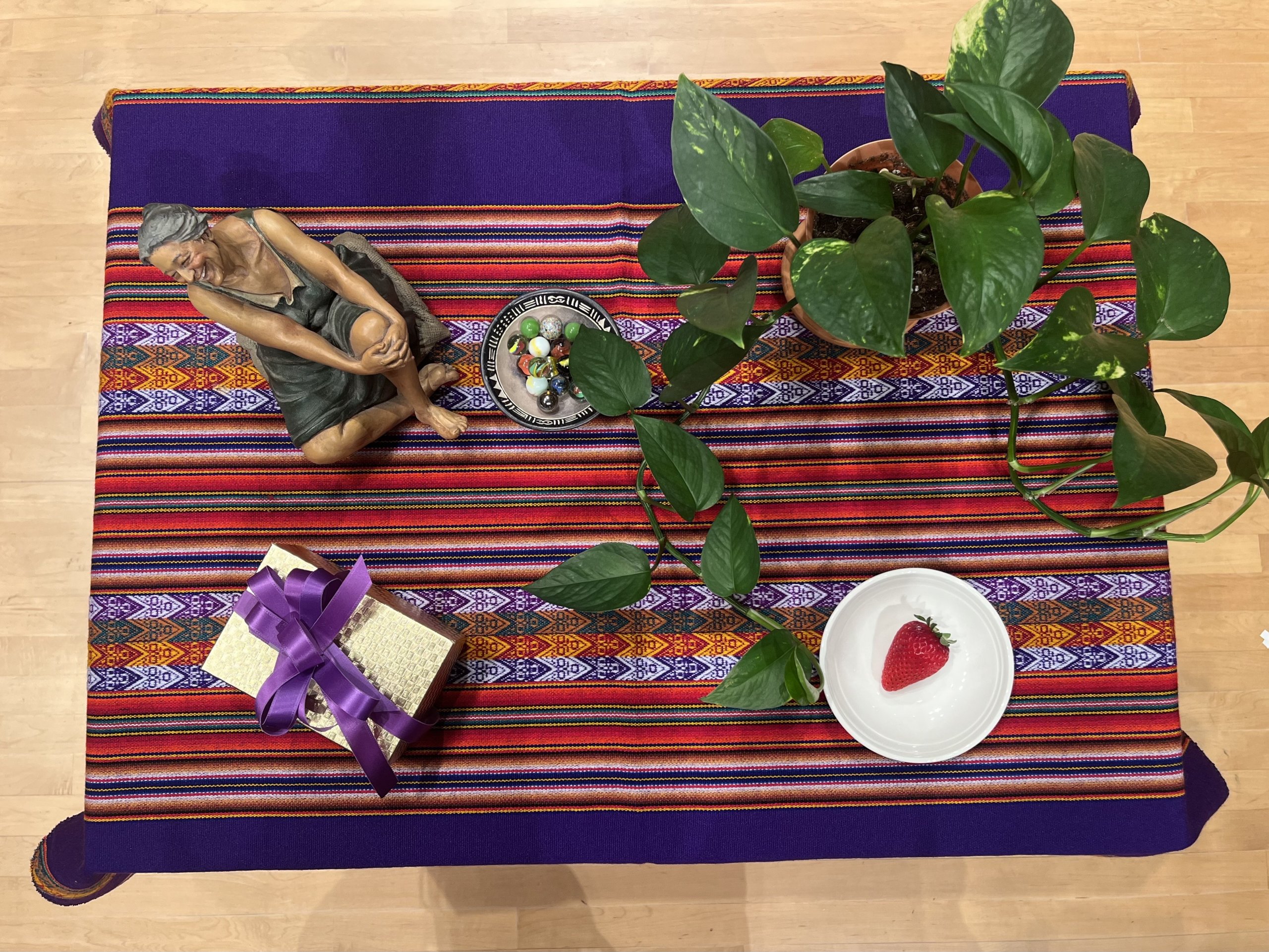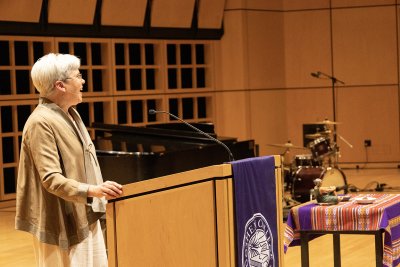Strawberry moments, and other thoughts about joy

Last weekend, I had the privilege of making my final speech to our 2025 graduating class of seniors at our baccalaureate service (view photos from it here). I will remember this class for their imagination, courage and enthusiasm. In planning this baccalaureate service, they chose the theme of joy. Here are a few of the thoughts I shared with them.
Joy is always setting a table for us.
Joy is always there, in the midst of everything, saying: “Sweetheart, taste and see that God is good.”
Joy sets the table in small acts of beauty and hospitality, like a hand-woven cloth from Peru, reminding us of global learning and all of the welcome and generosity we have experienced from host families, fellow travelers and faculty leaders.
In my living room is a small statue that personifies Joy. She speaks to me:
“Dear one, what happened to your smile? And by the way, those shoes look seriously uncomfortable. Take them off.”
Joy knows that I usually show up with other big emotions and complicated stuff. Joy can co-exist with other colorful feelings.
Are you struggling? Are you grieving? Joy knows that we are many things. Your weariness and anger and sorrow are also welcome at this table. Bring all your stuff. It’s okay if it’s a little noisy.
We just need to get to Joy’s table. There is an amazing turnaround that we can practice when we can’t find our way back to Joy’s table. Usually because we are feeling unloved.
Instead of focusing on the love we’re supposedly not getting, focus on the love that we are able to give.
Remember 8th-grade biology, when you learned about xylem and phloem? They are the vascular system of plants that transport water and other good stuff up and down the plant.
We are rooted in good soil. Rooted in Jesus. Rooted in love. We are like plants. Your xylem are taking the good love up from the soil and flowing them up where they can make fruit. And your phloem take all the good energy from the photosynthesis happening when sunlight hits your leaves and flow it back down to your roots.
My point is that the system has to flow both ways. On those days when you feel that your phloem are letting you down, and you’re just not getting enough love and light, get your xylem going. Wiggle your roots in the good soil and figure out how to send love up and out into the world.

Active love turns things around. It makes joy possible – not just for other people, but for you too.
Just get it flowing. Make it happen. Be creative, surprise yourself.
A long time ago, Kevin and I lived a couple of years in Indonesia while we were both working on my doctoral dissertation research. It was very rewarding and also a struggle. During that year, we began to talk about “strawberry moments” – our word for moments of delight or deep joy. We began to name them out loud to each other, “This is a strawberry moment.”
We are on the traditional land of the Potawatomi and Miami Peoples past and present, and we have committed to learn from them. In Potawatomi, the strawberry is the heart berry. They are the leaders of the berries, the first to bear fruit.
Wild strawberries, native to this region, are part of a world full of gifts simply scattered at your feet.
Robin Wall Kimmerer, Potawatomi author and biologist, asks how we should respond to the generosity of strawberries.
The answer is simple: eat them!
And remember that wild strawberries are part of the gift economy of nature.
“In the gift economy, gifts are not free. The essence of the gift is that it creates a set of relationships. The currency of a gift economy is, at its root, reciprocity.”
Our students graduate from Goshen College with a degree, but also with a set of relationships, a network woven from companionship, generosity and reciprocity. The degrees we confer are valuable evidence of their accomplishment. But just as importantly, together we become part of a fabric. We are connected. And social connection is the strongest predictor of human happiness.
Near the end of his life, Jesus spoke to his friends and students about vines and connectedness and joy. He said:
“I am the true vine, and God is the gardener. Remain in me, as I also remain in you. No branch can bear fruit by itself; it must remain in the vine. Neither can you bear fruit unless you remain in me. Remain in my love. This is my command: Love each other.
And then he said:
“I have told you this so that my joy may be in you and that your joy may be complete.”
One of the ways that I find my way back to Joy’s table is through music.
So I created a playlist for this class of songs that remind me of everything we have talked about: Love and transformation and connection and joy.
I had a lot of fun choosing these songs while thinking of our students. They have lifted me up in so many moments over the years they have been here. I wish them and you many strawberry moments!
Remain in love, and may your joy be complete.
Rebecca Stoltzfus




